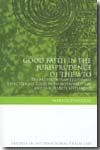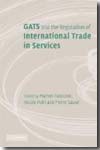Good faith in the jurisprudence of the WTO
the protection of legitimate expectations, good faith interpretation and fair dispu ute settlement
- ISBN: 9781841136202
- Editorial: Hart Publishing
- Fecha de la edición: 2006
- Lugar de la edición: Oxford. Reino Unido
- Colección: Studies in International Trade Law
- Encuadernación: Cartoné
- Medidas: 24 cm
- Nº Pág.: 393
- Idiomas: Inglés

What does the concept of good faith express? This book is the first to account for what good faith stands for in international trade law. It describes how, why and when the concept of good faith links WTO Agreements with public international law. It serves as a reference guide for scholars and practitioners by analysing how GATT/WTO dispute settlement institutions apply good faith in practice. Good faith is a general principle of law operating alongside treaties and customary rules. In WTO law, the principle of pacta sunt servanda, the prohibition of abus de droit and the protection of legitimate expectations are considered to be corollaries of the principle of good faith. An analysis of GATT 1947 and WTO case law reveals that the function of the principle of good faith varies. Panel and the Appellate Body reports make different use of it. The Appellate Body is prepared to apply the principle to WTO provisions only, while Panels use it more freely and substantively, that is, they apply good faith to fill lacunae in any of the WTO covered agreements. Also, adjudicators use the principle to strike a balance between, on the one hand, the obligation to liberalise trade, and on the other hand, the right to invoke an exception from trade liberalisation for the protection of the environment, culture, public morals, human life or health. In this way, good faith safeguards the gains of multilateral trade liberalisation against disgenuine interests such as disguised protectionism. To understand the operation of good faith in WTO law is not only important for trade law professionals. Ultimately, such understanding will likely be of strategic value for the increasingly pressing question how WTO law and other international agreements ought to be reconciled.







